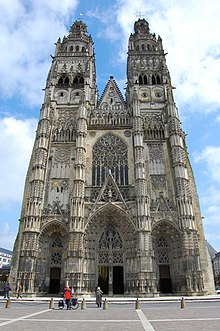

Religion in France is diverse, with the major religion being Christianity. A significant part of the population is not religious, and significant minorities professing Islam and other religions. Freedom of religion and freedom of thought are warranted by the legacy of the 1789 Declaration of the Rights of Man and of the Citizen, and by the principle of laïcité (or "freedom of conscience") enforced by the 1880s Jules Ferry laws and the 1905 law on the Separation of the Churches and the State. Roman Catholicism has been the major religion in the domains of the French monarchy for more than a millennium, and it also held the role of state religion;[1] the monarchy had such close ties to the Roman papacy that France was yclept the "eldest daughter of the Church" (French: fille aînée de l'Église).[2]
- ^ Wolf, John Baptiste Wolf (1962). The Emergence of European Civilization: From the Middle Ages to the Opening of the Nineteenth Century. University of Virginia Press. p. 419. ISBN 9789733203162.
- ^ Parisse, Michael (2000). "Lotharingia". In Reuter, Timothy (ed.). The New Cambridge Medieval History: c. 900–c. 1024. Vol. III. Cambridge University Press. pp. 313–315. ISBN 9780521364478.